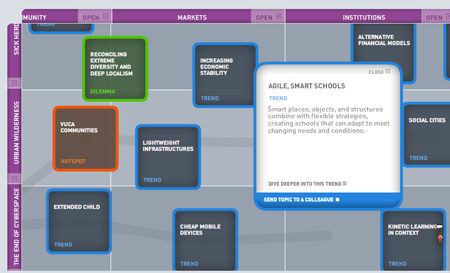Today being my 40th birthday, time is somewhat precious to me and mine. I don’t relish the idea of spending any more of my forty-something than I have to on this degree, so I have set a very ambitious goal to be done with my doctoral dissertation in a year. Even as I map out the short-term projects and paper deadlines to put me on that aggressive pace, a larger question looms: What happens next?
One of the attractions of an Informatics degree in a new program is the ability to apply it to academia or industry. There is more financial relief in the latter, potentially at a cost of personal control over projects and location. There is more freedom in academia, but at the cost of dollars and increased political bureaucracy. I come from a family of educators, so there is also a genetic attraction to being a professor. Whether or not that decision keeps me at a university, the future of education will remain an important issue for me.

“Drivers of Change” (source: KnowledgeWorks Foundation)
One of my buried blog drafts contained a pointer to an interactive map itemizing the factors that are likely to influence public education in the next decade. The map, commissioned by the KnowledgeWorks Foundation, is divided into five elements—a two-dimensional space listing Drivers and Impact Areas, and the factors classified as trends, hot spots and dilemmas.
Created by a range of experts and analysts, the map is a forecast of the future, and each element on the map represents forces that could affect learning in the next decade. Many of these forces can work in tandem, and they could also appear seemingly unconnected. Nothing is definite. We don’t encourage debating with the forecast, but rather encourage you to explore the map, think about what you’ve seen, and use the map and its interactive features for group and online discussion. Think of the map as a catalyst for conversation.
…
Public education in the United States is at a critical crossroads. The knowledge economy and globalization continue to challenge the basic industrial-era assumptions upon which most public schools, curriculum, and evaluation mechanisms are based. New interactive digital media are diffusing rapidly, even in lower-income communities, fostering a youth media culture that is crashing into schools and educators like a tsunami, raising issues of privacy, pedagogical relevance, and equity. Student performance is inconsistent across the country and average U.S. performance indicators lag disappointingly behind those of other countries.
Source: KnowledgeWorks Foundation
You can also download a PDF version and request a paper copy, which takes about three weeks to receive.
To facilitate the conversation, KnowledgeWorks also has a forum you can join and a library of resources to assist in deeper research. Futurist Eric Grant also maintains an interesting blog, discussing such things as the change in conversational tools and predictions that in 10 years half of high school classes will be taught online.
This is directly relevant to both informatics and parenting. Carter left public school largely because of a failure by the local institution to adequately address or even brainstorm about the issues and trends KnowledgeWorks identifies. I was particularly attracted to the End of Cyberspace and Strong Opinions drivers, which hint at the seemingly contradictory forces of increased personalization and fewer boundaries. I want to put one of the paper posters up on the wall of the new Ph.D. lab as the IU School of Informatics as inspiration and context for the work I do.
A video explaining the interactive map
Check out the online map. What trends most interest you?